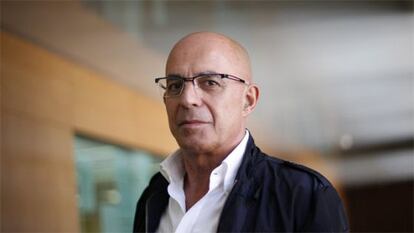What now for the legal watchdog?
General Council of the Judiciary needs overhaul to regain public confidence


Spain's General Council of the Judiciary, the CGPJ, is under unprecedented scrutiny following the resignation of its president, former Chief Justice Carlos Dívar, over allegations he used his expense account to fund private trips.
The man who blew the whistle on Dívar, fellow CGPJ member José Manuel Gómez Benítez, says that what he calls the "crisis" in the body "can only be overcome through root-and-branch reform: the way that its members are appointed; its function and responsibilities; the way it works - in short, it can't continue in the way it has been until now."
The CGPJ's members are appointed by Congress, which has led to the body becoming highly politicized, with the two main parties seeking to impose their candidates, and using it to settle political scores.
Gómez Benítez believes the resignation of Dívar should open the door to an overhaul of the CGPJ, and that by ruling that Dívar did not break the rules, the Supreme Court has "tried to hush up an issue over which hang a great many questions."
The crisis "can only be overcome through root-and- branch reform"
He says he backs proposals put forward earlier this year by Justice Minister Alberto Ruiz-Gallardón to change the way members are appointed, and that would no longer require full-time commitment by all those sitting on it.
Speaking to EL PAÍS, Gómez Benítez defended the CGPJ as a political steering committee, saying: "We establish judicial policy, in the same way that others do in health and education, for example. We are not there to lay down sentences."
Fernando de la Rosa, who has taken over the presidency of the CGPJ temporarily, has criticized Gómez Benítez indirectly, saying the accusations against Dívar have "caused him irreparable damage by entering into private matters."
Speaking to Onda Cero radio, Fernando de la Rosa insisted that the Supreme Court and the State Attorney's Office had found no indication of wrongdoing on Dívar's part, and that the whole affair was "based on personal motives," criticizing the media's interest in the affair as akin to "gossip columnists," speculating on his private life, rather than "the public role that he carries out."
The CGPJ will this week approve measures to improve transparency
Gómez Benítez says that Dívar himself is largely to blame. "A senior public official who pays for dinners on a Saturday evening with his expense account, and then fails to explain this is simply inviting others to find out why. It is perfectly licit, and inevitable, and he created the risk of it happening himself."
Gómez Benítez denies undermining the credibility of the CGPJ: "What has taken place is an exercise in transparency and access to information that the electorate has a right to know about." He added that as a result of the Dívar case, the CGPJ will this week approve measures to oversee expenses and improve transparency.
Gabriela Bravo, the spokeswoman for the CGPJ, told state television RTVE that Dívar had not handled the matter well, and had behaved "opaquely." She recognized that the public was not convinced by his explanations and "this had generated sufficient doubt that it was not possible to continue without a resignation. The head of the CGPJ has to be above suspicion. He or she must set an example, rather than simply appearing not to have used public money."
She added: "This grave institutional crisis, the most serious in the history of this country," must now be the basis for "the maximum transparency regarding the activities of the members of the CGPJ."
Margarita Uría, a member of the CGPJ, called for Dívar to step down two weeks ago. Speaking to EL PAÍS, she said Dívar should have apologized for what he did. At the same time, she says the affair has damaged the credibility of the CGPJ.
"Members of the council should always provide detailed accounts of their official trips. I have done so for many years. I have only once invited somebody to dinner on my expense account."
She believes that although the members of the CGPJ are often the result of horse trading between the main parties, the body itself acts independently.
Gómez Benítez is highly critical of the way the government, and particularly Ruiz-Gallardón, has handled the Dívar affair. "Dívar hung on for as long as he did because the justice minister and his secretary of state supported him. What happened was that in the end, almost all the members of the CGPJ distanced themselves from Dívar, leaving the minister alone to defend him. Gallardón will now have to explain to the electorate what he thinks of Dívar's trips."
Tu suscripción se está usando en otro dispositivo
¿Quieres añadir otro usuario a tu suscripción?
Si continúas leyendo en este dispositivo, no se podrá leer en el otro.
FlechaTu suscripción se está usando en otro dispositivo y solo puedes acceder a EL PAÍS desde un dispositivo a la vez.
Si quieres compartir tu cuenta, cambia tu suscripción a la modalidad Premium, así podrás añadir otro usuario. Cada uno accederá con su propia cuenta de email, lo que os permitirá personalizar vuestra experiencia en EL PAÍS.
¿Tienes una suscripción de empresa? Accede aquí para contratar más cuentas.
En el caso de no saber quién está usando tu cuenta, te recomendamos cambiar tu contraseña aquí.
Si decides continuar compartiendo tu cuenta, este mensaje se mostrará en tu dispositivo y en el de la otra persona que está usando tu cuenta de forma indefinida, afectando a tu experiencia de lectura. Puedes consultar aquí los términos y condiciones de la suscripción digital.








































